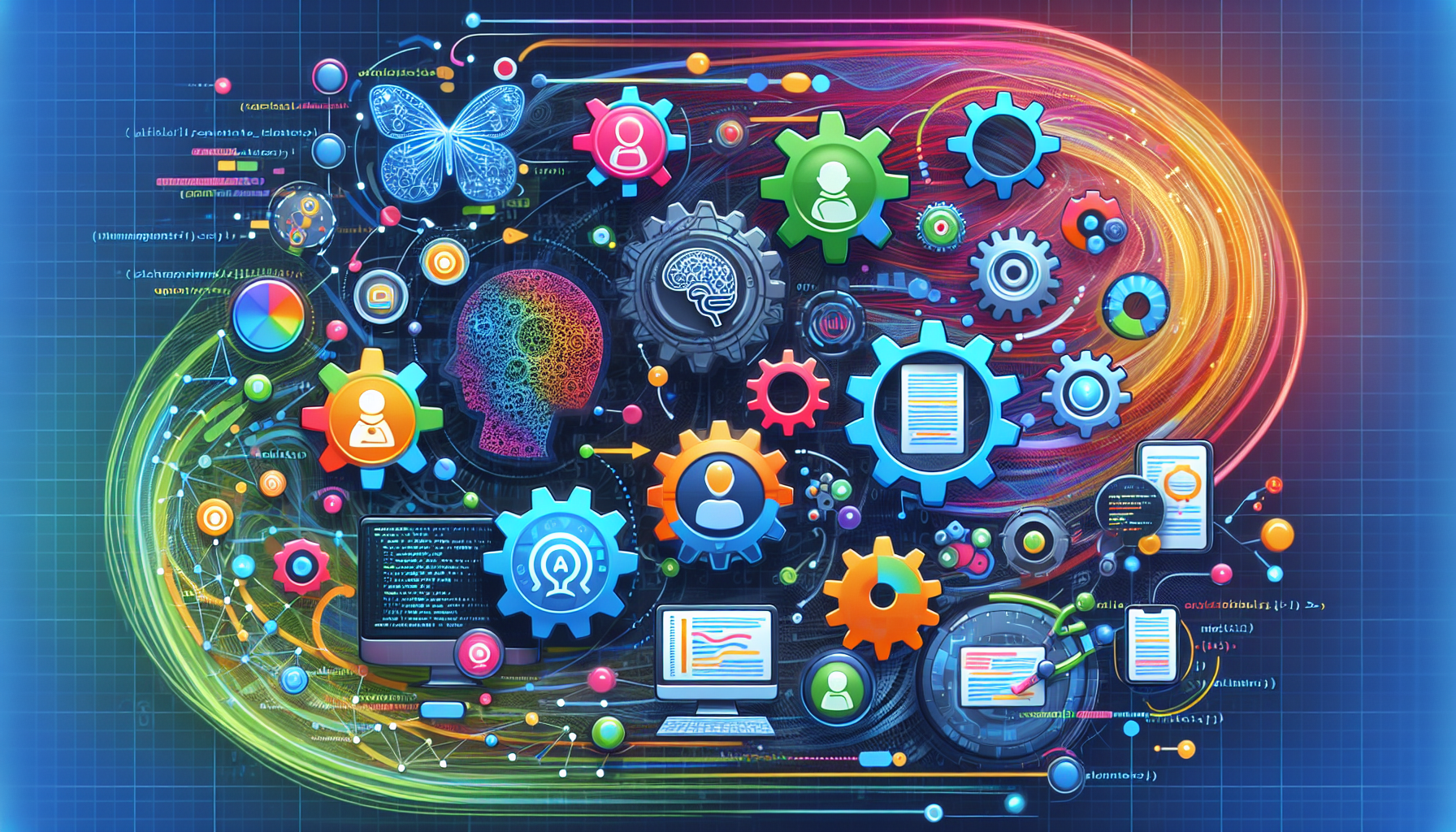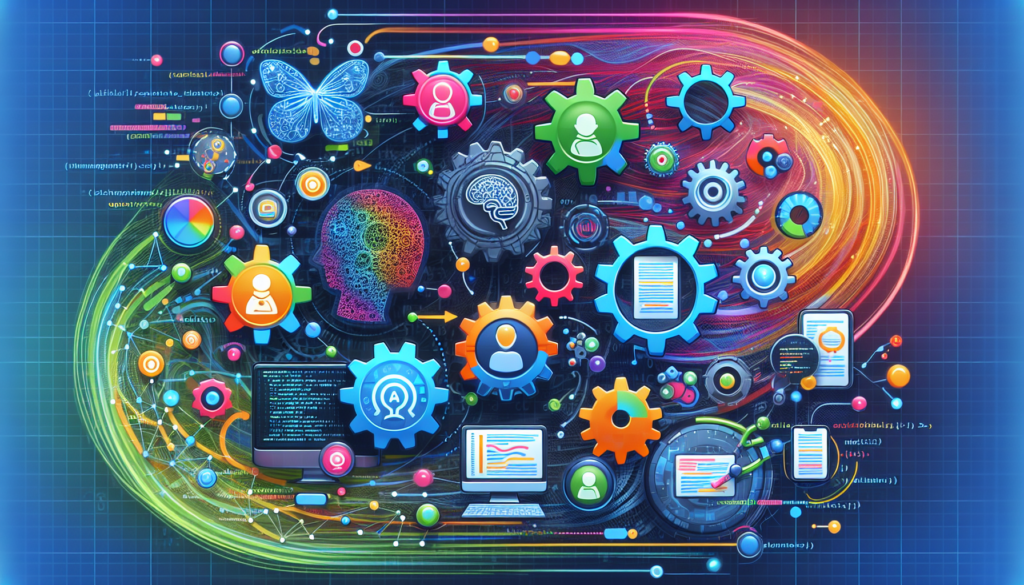AI powered DevOps accelerating software delivery and reducing downtime through automation, optimized workflows, and enhanced monitoring is a game changer. This article will reveal how integrating AI into DevOps helps teams deliver software faster, with fewer errors and better reliability. You’ll learn about the tools and techniques that make this transformation possible. AI-powered DevOps uses predictive analytics to foresee potential issues and optimize workflows.
Key Takeaways
- AI integration in DevOps enhances automation, data analysis, and monitoring, leading to faster and more efficient software delivery.
- Automated code reviews and real-time code suggestions powered by AI improve code quality and streamline the development process.
- AI-driven predictive deployment and resource management optimize continuous delivery, enhance security, and support ongoing improvement in software development workflows.
- Intelligent automation in AI-powered DevOps enhances efficiency and reduces manual intervention.
Introduction to AI in DevOps
What is AI in DevOps?
Artificial Intelligence (AI) in DevOps refers to the integration of AI technologies, such as machine learning and deep learning, into the software development lifecycle to enhance efficiency, quality, and reliability. By leveraging AI, DevOps teams can automate repetitive tasks, predict and prevent errors, and optimize the software delivery process. This integration transforms traditional DevOps practices, making the software development lifecycle more streamlined and effective.
AI in DevOps encompasses a range of applications, from automating code reviews and providing real-time code suggestions to optimizing CI/CD pipelines and enhancing system monitoring. These AI-driven capabilities enable teams to deliver software faster and with fewer errors, ultimately improving the overall software development process.
Benefits of AI in DevOps
The integration of AI into DevOps offers numerous benefits that significantly enhance the software development lifecycle:
- Improved Code Quality: AI-powered code reviews and real-time code suggestions help developers write better code by identifying potential issues and enforcing coding standards. This leads to higher code quality and fewer errors in the final product.
- Increased Efficiency: AI automates repetitive tasks such as testing and deployment, allowing developers to focus on more complex and strategic activities. This automation accelerates the software delivery process and reduces the time to market.
- Reduced Downtime: AI-powered monitoring and anomaly detection tools can identify potential issues before they become critical, enabling teams to address problems proactively. This reduces downtime and ensures a more stable and reliable software environment.
- Enhanced Collaboration: AI facilitates better collaboration among team members by providing insights and recommendations for improvement. This fosters a more cohesive and efficient development process, leading to better software outcomes.
Challenges of Implementing AI in DevOps
While the benefits of AI in DevOps are substantial, there are also challenges that organizations may face when implementing these technologies:
- Data Quality: AI relies on high-quality data to function effectively. In DevOps environments, data is often fragmented and siloed, which can hinder the performance of AI tools. Ensuring data quality and consistency is crucial for successful AI implementation.
- Integration: Integrating AI tools with existing DevOps processes and tools can be complex and time-consuming. Organizations need to invest significant resources to ensure seamless integration and interoperability.
- Skills and Knowledge: Implementing and using AI tools effectively requires new skills and knowledge. DevOps teams may need to undergo training and upskilling to leverage AI technologies fully.
The Role of AI in Modern DevOps

Artificial intelligence (AI) in DevOps has become a game-changer, enhancing processes by automating tasks and streamlining operations.
AI tools, driven by machine learning models, assist DevOps teams in various functions, including:
- automation
- data analysis
- monitoring
- optimizing CI/CD pipelines
This integration ensures that the software development lifecycle is not only faster but also more efficient. AI-driven predictive maintenance helps in identifying and resolving potential issues before they become critical.
One of the key benefits of incorporating AI into DevOps practices is its ability to address challenges related to concurrency, security, and handling sensitive information. AI tools such as Atlassian Intelligence and Dynatrace’s Davis enhance observability, providing valuable insights that help teams manage these challenges effectively. This leads to more reliable and secure applications, ultimately improving the overall performance of the development workflows.
Moreover, AI-powered tools enhance collaboration among functional roles, improving communication and coordination within DevOps teams. Automating previously manual and time-consuming tasks, AI enables teams to concentrate on strategic activities, fostering continuous improvement and innovation. As the DevOps market continues to evolve, leveraging AI will be essential for organizations aiming to stay competitive and deliver high-quality software at speed.
Enhancing Continuous Integration with AI
Continuous integration (CI) is a critical aspect of the software development lifecycle, and AI has made significant strides in enhancing this process. AI automates the building, testing, and deployment of code changes, streamlining CI/CD pipelines, reducing errors, and improving software quality. AI-powered automated testing accelerates the CI/CD process and ensures higher code quality. AI-driven tools are adept at adapting to developers’ workflows, making the integration processes more efficient and reliable.
AI improves the reliability of CI/CD pipelines by identifying recurring gaps in testing coverage and mitigating them, thus ensuring higher code quality. Additionally, machine learning analytics of past runs optimize CI/CD pipelines, predicting problems that might occur in later steps or future runs. This not only accelerates the development process but also enhances the overall software delivery process.
The following subsections explore how AI-powered automated code reviews and real-time code suggestions contribute to improving code quality and efficiency.
Automated Code Reviews
Automated code reviews powered by AI have revolutionized the way code quality is maintained throughout the software development lifecycle. AI-assisted code review tools analyze code changes to provide suggestions and enforce coding standards, significantly improving code quality. These tools can automatically enforce coding standards, ensuring compliance with best practices and reducing the need for manual processes.
One notable AI-powered code review tool is Amazon CodeGuru, which automates code reviews and provides smart feedback on code quality, helping to identify potential issues early in the development cycle. Another tool, PullRequest, facilitates addressing issues found in code reviews by offering inline comments and suggested fixes, speeding up the resolution process. These AI tools are highly customizable, allowing development teams to tailor the rules and checks to fit their specific needs.
Furthermore, AI-assisted code review systems can improve review efficiency by suggesting the right code reviewers based on their expertise and past contributions. This ensures that code reviews are performed by the most qualified individuals, leading to higher quality reviews and faster development cycles. By automating tasks and enhancing the review process, AI tools play a crucial role in maintaining higher code quality and efficiency in DevOps workflows.
Real-time Code Suggestions
Real-time code suggestions powered by AI are another significant advancement in improving code quality. These suggestions assist developers during the coding process, leading to fewer bugs and improved coding practices. AI provides valuable insights and suggests improvements during coding, helping developers adhere to best practices and avoid common pitfalls.
The overall impact of real-time code suggestions includes enhanced code quality and faster delivery of software projects. Minimizing bugs and accelerating the coding process, AI improves code quality and contributes to more efficient development workflows. This real-time assistance allows developers to focus on higher-level problem-solving, ultimately leading to better software outcomes.
Streamlining Continuous Delivery with AI

Continuous delivery (CD) is a critical component of modern software development, and AI has a profound impact on streamlining this process. AI automates deployment processes, enhancing the speed and reliability of software releases, ensuring new features and updates reach users quickly and with fewer issues. AI-driven deployment automation enhances the speed and reliability of software releases, making the entire process more efficient. AI facilitates the automation of testing processes, which is crucial for enabling continuous delivery in the software development lifecycle.
One of the key benefits of AI in continuous delivery is its predictive capabilities, which enable early detection of potential failures in DevOps workflows. AI can automate the testing of new code, helping developers swiftly identify and fix errors before they reach production. This proactive approach ensures that the software delivery process is more reliable and efficient.
In the subsections that follow, we will delve into how AI is used for smart rollouts and predictive deployment decisions, further enhancing the continuous delivery process.
Smart Rollouts
AI plays a pivotal role in executing smart rollouts during the software delivery process. AI determines the appropriate times to activate or deactivate feature toggles based on specific use cases, ensuring smooth introduction of new features without disruption. This intelligent management of feature toggles helps in maintaining a stable production environment while progressively rolling out new enhancements.
Furthermore, AI monitors real-time feedback and issues to decide traffic direction between different product versions. If any issues are detected, AI can attempt to fix the code on the fly or roll back changes to maintain system stability. This ability to make real-time adjustments ensures that users experience minimal disruption and that any potential issues are addressed promptly.
Predictive Deployment Decisions
Predictive deployment decisions powered by machine learning models are a game-changer in minimizing risks associated with software releases. These models can forecast optimal deployment timings by analyzing historical data, helping to mitigate potential risks. AI predicts the best times for software deployments, ensuring new releases roll out during periods of low user activity or system stability.
This predictive capability is crucial for enhancing efficiency in the delivery process and minimizing the chances of deployment-related issues. By leveraging machine learning, DevOps teams can make informed decisions about when to deploy new code, ensuring a smoother and more reliable software delivery process.
This proactive approach to deployment further underscores the importance of AI in modern DevOps practices.
Enhancing Collaboration in Software Development
Collaboration is a cornerstone of successful software development, and AI can significantly enhance how teams work together. By leveraging AI-powered tools, DevOps teams can improve communication, streamline workflows, and ensure higher code quality.
- AI-Powered Code Reviews: AI tools can analyze code changes and provide feedback to developers, helping to identify errors and enforce coding standards. This not only improves code quality but also speeds up the review process, making it more efficient and effective.
- AI-Powered Code Suggestions: During the coding process, AI can offer real-time suggestions to developers, helping them adhere to best practices and avoid common pitfalls. This leads to fewer bugs and a more streamlined development process.
- AI-Powered Project Management: AI can assist project managers in prioritizing tasks, allocating resources, and predicting project timelines. By analyzing historical data and current project metrics, AI provides valuable insights that help in making informed decisions.
- AI-Powered Communication: AI can facilitate better communication among team members by providing insights and recommendations for improvement. This ensures that everyone is on the same page and working towards common goals, enhancing overall team efficiency.
By enhancing collaboration through AI, DevOps teams can work more efficiently and effectively, ultimately improving the quality and reliability of software delivery. This collaborative approach, supported by AI, fosters a culture of continuous improvement and innovation, driving better outcomes for software development projects.
AI Driven Testing Automation
Testing is a critical phase in the software development lifecycle, and AI-driven automation has significantly improved this process. AI enables teams to automate testing, expedite issue identification and resolution, and ensure code is ready for deployment. AI-powered test automation ensures comprehensive testing coverage and faster issue resolution. AI enhances the automation of testing processes, maintaining higher standards of code quality and reducing the risk of bugs in production.
Incorporating AI into testing not only speeds up the CI/CD process but also ensures that the code quality is consistently high. The following subsections will explore optimized test selection and proactive issue detection, highlighting how AI tools contribute to more efficient and effective testing practices.
Optimized Test Selection
AI significantly enhances test selection by pinpointing the most pertinent test cases after code modifications. This optimized selection ensures that only the most relevant tests are run, reducing the overall testing duration and accelerating the CI/CD process. AI efficiently selects tests based on recent code alterations, helping maintain higher code quality and improving overall efficiency.
This approach not only reduces the time spent on testing but also ensures that critical tests are not overlooked. By focusing on the most relevant test cases, AI-driven test selection contributes to faster and more reliable software releases, ultimately enhancing the software development lifecycle.
Proactive Issue Detection
Proactive issue detection is another area where AI excels in testing automation. AI tools can automatically uncover and resolve issues before they escalate, ensuring that potential problems are addressed early in the development process. Models predict potential issues before they happen, allowing teams to take preemptive action and maintain system stability.
For instance, Amazon DevOps Guru improves operational performance and availability by utilizing AI to correlate and group anomalies for faster root cause analysis, thereby reducing incident resolution time. This proactive approach to issue detection ensures that the software remains robust and reliable, minimizing the risk of bugs reaching production.
Improving Monitoring and Alerting with AI

Real-time monitoring and alerting are essential for maintaining system health and performance, and AI has significantly enhanced these processes. AI tools provide real-time visibility into system performance, allowing teams to detect potential issues and generate alerts proactively. Incorporating AI allows organizations to ensure continuous monitoring and swift resolution of any anomalies that may arise.
AI tools can monitor system health at each stage of the DevOps process, pinpointing areas for enhancement and ensuring that potential issues are addressed before they escalate. The following subsections will delve into anomaly detection and root cause analysis, highlighting how AI tools contribute to more effective monitoring and alerting.
Anomaly Detection
Anomaly detection through AI helps teams spot potential issues early, reducing both downtime and defects. AI enhances the ability to analyze data for detecting anomalies that could lead to significant incidents, ensuring that any irregular patterns are identified and addressed promptly. AI analyzes historical data to improve anomaly detection, making it more effective in maintaining system stability.
This proactive approach to anomaly detection ensures that potential issues are resolved before they impact users, enhancing the overall reliability of the system. By leveraging AI for anomaly detection, organizations can maintain higher standards of performance and reduce the risk of unexpected disruptions.
Root Cause Analysis
AI aids in root cause analysis by identifying fundamental issues that lead to development problems. AI utilizes logs, performance metrics, and other assorted data to help teams swiftly identify and comprehend the origins of issues, leading to faster resolution times. AI streamlines root cause analysis by correlating data from various sources to pinpoint underlying issues.
This capability enhances the team’s ability to resolve problems efficiently, ensuring that similar issues do not recur in the future. By incorporating AI into root cause analysis, organizations can achieve more reliable and robust software development workflows.
Security Enhancements Through AI

Security is a paramount concern in software development, and AI significantly enhances the ability to identify and mitigate security vulnerabilities. AI-powered security automation identifies and mitigates vulnerabilities in real-time, ensuring that potential threats are addressed as they arise. AI assists in understanding and mitigating software vulnerabilities by proactively detecting security issues through code and configuration analysis. Tools like Snyk continuously monitor application dependencies for vulnerabilities and misconfigurations, ensuring that potential threats are identified and addressed promptly.
AI automates threat responses by updating or isolating vulnerable code after identifying threats, enhancing overall security. This automation ensures that security vulnerabilities are managed effectively, reducing the risk of breaches and ensuring data security. AI tools summarize vulnerabilities and suggest mitigation strategies, enhancing workflow efficiency for developers and allowing them to focus on creating secure code.
Furthermore, AI contributes to real-time threat detection and response, improving incident response times and ensuring that organizations can maintain robust security postures. By leveraging AI for security enhancements, organizations can stay ahead of potential threats and ensure the safety of their applications and data.
Resource Management Optimization
Effective resource management is crucial to maintaining optimal performance and cost-efficiency in any DevOps environment. AI optimizes resource allocation by analyzing usage patterns and identifying underutilized resources, dynamically scaling them as needed. AI-driven resource optimization ensures efficient utilization and cost savings. This dynamic scaling helps reduce costs and improve efficiency, ensuring that resources are utilized to their fullest potential.
AI also assists in proactive resource management by identifying resource exhaustion and sending low-noise notifications to the team, enabling timely interventions. Machine learning models can forecast resource needs, allowing for proactive adjustments before any issues arise.
Leveraging AI enables organizations to minimize resource wastage and ensure maximum performance during peak loads, ultimately achieving significant cost reductions.
Continuous Improvement Efforts with AI
Continuous improvement is at the heart of DevOps practices, and AI plays a pivotal role in driving these efforts. By analyzing diverse data streams, AI uncovers trends and pinpoints areas for improvement in the software delivery process. AI-driven process optimization identifies areas for improvement and enhances overall efficiency. This data-driven approach helps organizations identify irregularities and make informed decisions, leading to faster development phases and improved software quality.
AI-driven insights reveal patterns in resource consumption, guiding future development efforts and optimizing the delivery process. AI continuously monitors and analyzes performance metrics, ensuring that DevOps teams maintain a cycle of ongoing enhancement, fostering a culture of innovation and excellence.
Case Studies of AI in DevOps

Real-world case studies illustrate the transformative impact of AI in DevOps. For instance, a major bank utilized MLOps to enhance its fraud detection capabilities, increasing the accuracy of its models from 85% to 94%, significantly reducing fraudulent transactions. The integration of MLOps in this financial institution also allowed for faster updates to machine learning models, enabling the organization to quickly adapt to new fraud tactics. A specific case study highlights how a leading e-commerce company used AI to optimize its continuous integration and continuous deployment (CI/CD) pipeline, resulting in a 30% reduction in deployment time and a 20% increase in deployment success rate.
These examples demonstrate how incorporating AI is reshaping how organizations streamline processes and adapt to changing business needs. By leveraging AI, organizations across various sectors are achieving higher efficiency, improved security, and better overall performance in their DevOps practices.
Summary
In summary, AI is revolutionizing DevOps by automating tasks, improving code quality, and enhancing the software development lifecycle. From automated code reviews to real-time code suggestions, AI tools are enabling continuous integration and delivery with greater efficiency and reliability. Proactive issue detection and optimized test selection are ensuring that the code is robust and ready for deployment.
Furthermore, AI is enhancing security, optimizing resource management, and driving continuous improvement efforts. Real-world case studies highlight the significant impact of AI in various industries, demonstrating the tangible benefits of incorporating AI into DevOps practices. By leveraging AI, organizations can stay ahead of the curve, delivering high-quality software faster and more reliably. Embrace the power of AI in DevOps and unlock new possibilities for innovation and excellence.
Frequently Asked Questions
How does AI enhance the software development lifecycle in DevOps?
AI enhances the software development lifecycle in DevOps by automating repetitive tasks and improving code quality, resulting in faster and more efficient development processes. Additionally, it offers valuable insights through data analysis and monitoring tools. Predictive analytics helps in foreseeing potential issues and optimizing workflows.
What are some examples of AI tools used in DevOps?
AI tools such as Amazon CodeGuru for automated code reviews, PullRequest for enhancing code quality, and Amazon DevOps Guru for proactive issue detection and root cause analysis are instrumental in optimizing DevOps processes. These tools facilitate improved code management and operational efficiency.
How does AI-driven testing automation improve code quality?
AI-driven testing automation enhances code quality by identifying the most pertinent test cases and expediting the testing process, while also proactively uncovering issues, thereby ensuring robust code for deployment.
In what ways does AI enhance security in DevOps?
AI enhances security in DevOps by automating the identification and mitigation of software vulnerabilities, responding to threats in real-time, and strengthening the overall security posture of applications and data. This proactive approach to security ensures a more reliable and safe development environment.
How does AI optimize resource management in DevOps?
AI enhances resource management in DevOps by analyzing usage patterns, enabling dynamic scaling of resources, and forecasting future needs, which ultimately reduces costs and improves efficiency.
About InTech Ideas
If you’re looking to elevate your tech strategy and drive business growth, InTech Ideas is here to help. We offer a comprehensive suite of services, including Software Development Teams, Product Development Fast Track, and Product Leadership & Advisory. Whether you need to scale your development team, fast-track your product, or bring in expert leadership, we provide tailored, people-first solutions that align with your company’s goals. Learn more about how we can support your journey by exploring our services or contacting us today to discuss your specific needs.

